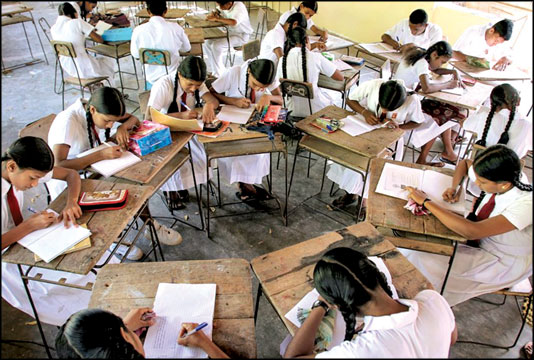New paradigms in education: Building new knowledge
by Anil Pagoda Arachchi
Every year knowledge in the world doubles and the world move fast by
leaps and bounds. Therefore, the education system of any country must be
geared to a new paradigm which brings forth a new vision of education.
In this context, what should be the main goal of formal education? It is
ludicrous to imagine whether students are in a position to take stock of
all the knowledge available in relation to the subject areas they study
in school. Another important question is whether they must be made to
take for granted the existing knowledge of the world.
Nature of knowledge
 Is knowledge a self-standing unit that can exists on its own? The
traditional view of knowledge is that it is a free-standing unit with an
existence of its own residing in books and other sources. And also,
knowledge is divorced from the people who create it. Is knowledge a self-standing unit that can exists on its own? The
traditional view of knowledge is that it is a free-standing unit with an
existence of its own residing in books and other sources. And also,
knowledge is divorced from the people who create it.
This view is rather obsolete and it does not hold any truth in the
present-day context. Instead it can be viewed as a living process and
people are incessantly involved in generating their own knowledge from
their own experiences and learning.
Constructivist approach
It is not anything static, it is in a constant process of development
with people who generate knowledge with a new understanding of the world
around them.
With these changes emerging, how should the formal education system
of the country be changed? Will providing opportunities for the students
to build knowledge of the concepts to be taught pave a way for them to
be creative or competent?
What is most important, as I see it, is to provide meaningful
situations for them to challenge the existing knowledge and build their
own understanding of the physical and social phenomena. The development
of the individual and the society depends on this new knowledge.
The constructivist approach which is in vogue all the world over is
no doubt the best to be used for this purpose.
However, a pertinent question is whether we should incorporate it
into our teaching learning process only to facilitate the students to
build their knowledge by themselves for the purpose of comprehending
conventionally established concepts and facts.
On the contrary, what we should attempt it is to pave every possible
way for the students to challenge the existing stock of knowledge base
and perceive the world and its physical and social phenomena with
different perspectives.
This becomes necessary due to a number of factors.
Social process
One distinctive characteristic of knowledge is that its nature tends
to changes from one socio-cultural context to another.
As discussed elsewhere in this article, the culture and social
process of any society shapes and colours its knowledge.
For example, Piaget's findings of concept formation can vary in a
different cultural context, and therefore his knowledge cannot be
applied in the same way for a set of individual from a different
cultural background.
What I want to emphasise here is the notion that teaching process
should help students recover and unshackle themselves from the
constraints of so-called socially and culturally established rather
conventional knowledge base and to explore new knowledge and to form new
concepts of their own.
Students must be made more critical so that they could release
themselves from the constraints embedded in the social milieu which acts
as a repertoire of its knowledge.
What should be done
The present education system can achieve these goals with some
changes. Syllabi and the textbooks rewritten by taking into account this
paradigm according to which theoretical and practical background could
be created within the school system and outside for students to
challenge the existing knowledge and generate new knowledge in whatever
they learn.
This paradigm can be very effectively executed only if the teachers
are properly trained for the task.
The main function of the teacher should be to facilitate the students
to be critical, analytical and innovative to create a new world in the
world they live.
One salient drawback of introducing innovations to the education
system is that the examination system does not change parallel to the
reforms brought in the effectiveness of any change increasingly depends
on the evaluation system.
Therefore, there should be an organic relationship among the Ministry
of Education, the Department of Examination and the NIE to plan and
implement such a change to the school system.
One important factor we see in the developed world and countries such
as South Korea and India is that their education systems are constantly
supported by the findings of the research studies.
No reform would work well if it does not get social acceptance. Thus,
first there must be a comprehensive plan based on the findings of the
research projects that can be done on this change. |


